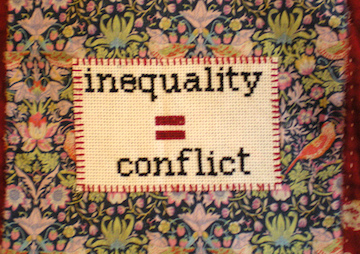We Won’t Fix Inequality by Tweaking Capitalism
The disparities in wealth that we term "income inequality" happened by design, writes social critic Stephen Thrasher. And “they can’t be fixed by fiddling at the edges of our current economic system.” craftivist collective / CC BY 2.0
craftivist collective / CC BY 2.0
The disparities in wealth that we term “income inequality” happened by design, writes social critic Stephen Thrasher in The Guardian. And “they can’t be fixed by fiddling at the edges of our current economic system.”
“It is not as if the rich are a little more equal and the poor a little less equal, and if we shift a bit we’ll all come out in the middle,” Thrasher continues. “What we’ve been calling ‘income inequality’ might be better understood as a war waged by US political and economic policy on the poor.”
Income inequality is better termed structural racism. White people earn more money with less education than black people and consistently have half the unemployment of black people. And, as new research has shown, “family wealth” predicts outcomes for 10 to 15 generations. Those with extreme wealth owe it to events going back “300 to 450” years ago, according to research published by the New Republic – an era when it wasn’t unusual for white Americans to benefit from an economy dependent upon widespread, underpaid black labor in the form of slavery.
Income inequality is better viewed as structural sexism. Women earn 78 cents on the dollar overall compared to white men, but black women only earn 64 cents and Latinas 56. Women are also routinely discriminated against economically for bearing children.
Income equality is better viewed as structural child abuse. In the United States, one in five children needs government help to eat. As Aisha Sultan recently wrote in the Education Writers Association, if a 30-child classroom looked like the nation at large, seven of the children would be living in poverty, six would be victims of abuse and one would be homeless. These kids aren’t just unequal; they are never offered the opportunity to achieve equality.
Income inequality is better viewed as economic genocide, which shortens the lives of the poor. As the New York Times bluntly put it last year, “where income is higher, life spans are longer”. For one of the most jarring examples of how this plays out, look no further than the Ferguson Report, which shows how just in St Louis County, the average life expectancy ranges from 91 in the whitest neighborhood to 56 in the poorest, blackest neighborhood.
Read more here.
— Posted by Alexander Reed Kelly.
Your support matters…Independent journalism is under threat and overshadowed by heavily funded mainstream media.
You can help level the playing field. Become a member.
Your tax-deductible contribution keeps us digging beneath the headlines to give you thought-provoking, investigative reporting and analysis that unearths what's really happening- without compromise.
Give today to support our courageous, independent journalists.






You need to be a supporter to comment.
There are currently no responses to this article.
Be the first to respond.